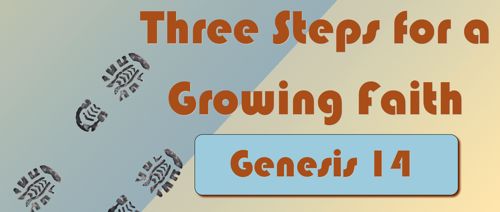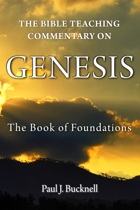
Book of Genesis: The Book of Foundations
The Bible Teacher's Commentary
Paul J. Bucknell

Three Steps for a Growing Faith
Genesis 14:1-24
Genesis 13 setting | Step #1 Observe | God's Protection | Application | Step #2 Utilize | Hebrew | Abram's Decison | God's Love | #3 Secure -1 | Secret Prayer 2-3 | King Melchizedek 14:18-20 | Spiritual Picture | Melchizedek in Bible | Closing Application
Understanding the Term 'Hebrew' (Genesis 14:11-13)
In Genesis 14:11-13 Abram is called a 'Hebrew'. This is the first place this interesting term is used. Learn more about how the world Hebrew shares an interesting theological perspective.
Interestingly, the term 'Hebrew' applied to Abram here has a very significant meaning is first used here in Genesis 14:11-13.
“Then they took all the goods of Sodom and Gomorrah and all their food supply, and departed. 12 And they also took Lot, Abram’s nephew, and his possessions and departed, for he was living in Sodom. 13 Then a fugitive came and told Abram the Hebrew. Now he was living by the oaks of Mamre the Amorite, brother of Eshcol and brother of Aner, and these were allies with Abram” (Genesis 14:11-13).
 Before going on, let us comment on this term ‘Hebrew’. It is the first time in the Bible that it is used. The term could be interpreted as one ‘from afar’ or ‘from beyond.’ It is similar to our notion as alien or even pilgrim, passing through.
Before going on, let us comment on this term ‘Hebrew’. It is the first time in the Bible that it is used. The term could be interpreted as one ‘from afar’ or ‘from beyond.’ It is similar to our notion as alien or even pilgrim, passing through.
The scholars are pretty sure that the term is connected to Eber, one of his forefathers, making sure that the promises made to Shem, the son of Noah would follow on to Abram (Genesis 10:21, 11:14-26).
The term, however, was rarely used among the Hebrews to describe themselves, but as in this case was used by an outsider to describe Abram.(Theological Wordbook of the Old Testament, Volume 2, pg. 643.)
The author no doubt inserts this to remind us of Abram’s alien status, but the scriptures are cleverly linking Abram with the Shemite line and to God’s promises.
To the world, Abram was an outsider. He didn’t belong. In view of God, however, Abram was God’s precious and chosen one through whom God was specially working.
The parallel between Abram and God’s people today remain the same. Truly we as believers in Christ are sons of Abraham. Like the disciples of old that Peter wrote to, we are but aliens scattered about (1 Peter 1:1). As pilgrims in this world, we declare this is but a temporary foreign land that we live in, and though still in God’s presence, our real home is the one God has promised.
Application
-
Have you ever felt that you do not belong when people don’t like you for your faith and decision? Do not be tempted to side with the world even for a moment.
-
Rejoice in God’s choice of you and thank Him for His love and work in your life. One day soon you will be with Him in the Promised Land.
Next => Abram’s big decision
Other BFF reading: Word Study of Faith and Faithfulness (pistos aman). The Hebrew people were down to earth. Their words were not philosophical but practical. The NT Greek was highly influenced by the Greek philosophers, even
info@foundationsforfreedom.net
Scriptures typically quoted from the New American Standard Bible unless noted:
(C) Copyright The Lockman Foundation 1988










